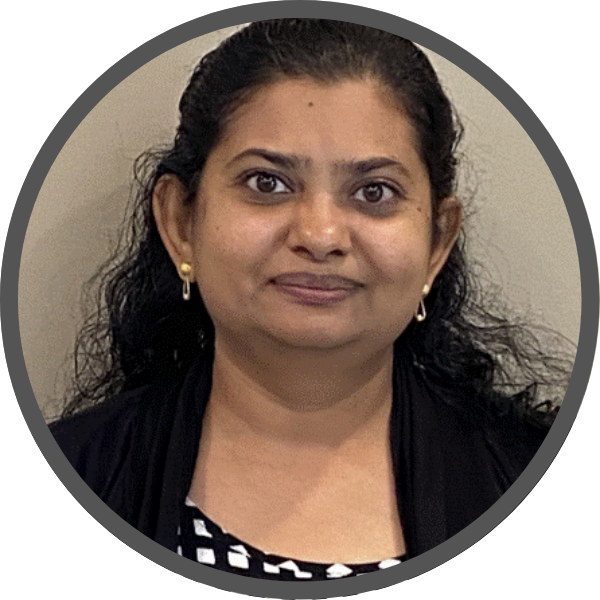.png)
 Since we have a brand new board, we've decided to resurrect this series so you can get to know us a little better. Today's post is with Priya Balachandran, Prospect Research and Management Specialist at the Northern Illinois Food Bank and Apra-IL's Director of Membership.
Since we have a brand new board, we've decided to resurrect this series so you can get to know us a little better. Today's post is with Priya Balachandran, Prospect Research and Management Specialist at the Northern Illinois Food Bank and Apra-IL's Director of Membership.


1. What is the superpower that you use often at work?
Conscientiousness. It helps me ensure the accuracy, reliability, and ethical conduct of the research and reporting. It also plays a vital role in improving my time management, organizational skills, and collaboration within my team, all of which collectively contribute to more successful and impactful research.
2. What is one thing Apra has done for you?
I am a lifelong learner, and Apra is the right place for me to access the necessary resources and updates for my ongoing professional development. Through diverse and continuous learning opportunities, Apra ensures that I remain at the forefront of industry advancements. This has not only deepened my expertise but has also connected me with a network of like-minded professionals, enriching my overall professional journey.
3. If the annual Apra International conference could be anywhere in the world, where would you want it to be?
Venice, Italy… OK… let’s be realistic… Chicago
4. How do you explain your role to people outside of Development?
In simple terms - I am a Researcher in the Philanthropy team. If they are interested in a little more detail, then would explain - I am engaged in extensive data analysis, interpretation, and reporting to support the philanthropy team in strategic operations and programs. I help the organization understand potential supporters and engage with them in the most meaningful and aligned way with their values, ultimately contributing to enhancing the organization's efforts in better serving the community.
5. If you were not in Prospect Research, what career would you have
Healthcare... well, that's where I came from. So, if I were not a Prospect Researcher, I would have continued in the healthcare field.
6. If you could tell your 15-year-old self about your job, what would you say?
I do research to support the philanthropy team. But it's not just any boring, serious research... I magically crunch lots of data and facts, turn them into cool information, and write stories – just like the epic tales you love to read. By doing all this, I help my organization become even better at making the world a happier place!
7. Why did you join the Apra-Illinois board?
Being an Apra international member for quite some time, I wanted to get involved with my local chapter as well and so when the opportunity was offered, I happily joined the Apra-IL board. Joining the board gave me an opportunity to collaborate with like-minded individuals and contribute more to the field.
8. Why do you think Apra-Illinois and all of the local Apra chapters matter?
Local chapters like Apra-Illinois hold significant importance as they provide a real pulse on field developments and foster stronger connections within the community. This aspect is particularly valuable for individuals seeking in-person networking opportunities and a deeper understanding of regional trends.
9. What is your #1 productivity tip?
Maintaining and using a well-organized ‘To-Do Planner’.
10. Best advice ever received?
'You are not better than anyone, and nobody is better than you.' The best advice I ever received… equity and equality - explained in simple words.
11. If you wrote a book about prospect development what would it be called?
“Philanthropy: Behind the Scenes”
12. If you wrote a memoir on your life, what would it be called?
“From Self to Service”
13. What book are you reading right now?
Patrick Lencioni’s The 6 types of Working Genius
14. Currently, what is your favorite restaurant in your city?
A2B and Vai
15. What is your favorite social platform to connect with people?
When it comes to personal connections, I prefer text and in-person chats rather than connecting on a social media platform, but for professional or work-related matters, LinkedIn is my favorite.
16. What is the last movie you watched?
"The Super Mario Bros.” (…yes, I have a crazy Nintendo fan at home ;)
17. If you could have dinner with anyone living or dead, who would it be?
I believe I am already dining with people I love.
18. What is your hobby?
Intentional Doodling
19. Are you a texter or a caller?
Texter. That way I can keep it simple and stick to what I want to say and what I want to know.
20. Who or what inspires you?
As I wrap up every day, feeling assured that being an invisible, tiny drop in an ocean feels great too when you know that what you do helps someone who doesn't even know who you are. This keeps me going and motivated.
